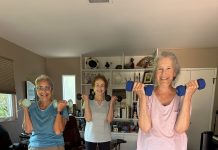When we think of being brave, we may think about standing up for ourselves as if an intruder came into our home, or perhaps someone is about to step in front of a car and we risk our lives to get them safe.
There are two other types of being brave that often go unrecognized, but the impact is enormous, sometimes changing people’s lives. Most of the time these types of being brave are not recognized, yet are essential in our day to day living. We may even feel very alone in our braveness, or unnoticed. Nonetheless this is the type of brave that is fundamental in our growth as a person, as families and as communities.
The first type of brave I call the “big small brave.”
This is when we do the right action over and over again even though people may not be watching. An example might be not picking up our cell phone even though we want to take the call but knowing that another conversation right now is more important.
It is moving the neighbors’ newspaper every morning so the sprinklers do not get it wet.
It is my office colleague who has carried my bag to my car every day since I broke my shoulder no matter what he was in the middle of. Being brave is being kind to others when we do not need to.
I was told that my grandfather would go around and drop off firewood in the winter to people who he knew could not afford it. Supposedly he would never tell anyone what he did. I believe we get more out of being this brave than the person receiving.
The second type of brave I call the “big big brave.” It is similar to the “big small brave” in that we might still feel alone, may not get recognition and we may still not end up getting what we want. There is often more risk of getting hurt or rejected in this type of braveness.
People choose to do what is hard, even though they are unsure of the outcome. “They want to do what is right, what is brave.
This is not easy to do, and I respect the courage it takes to be this type of brave. This might mean ending an affair because you know it is hurting your partner. It could be saying to a child “I can’t support your drug use” and they leave home. These are the “big big braves” that change lives; the bravest of the brave. This is when we are willing to choose to do what is brave or right more than what is easy or what feels good in the moment.
I am going to leave you with something written by H. Jackson Brown, Jr.
“Be brave. Even if you’re not, pretend to be. No one can tell the difference. Don’t allow the phone to interrupt important moments. It’s there for your convenience, not the callers. Don’t burn bridges. You’ll be surprised how many times you have to cross the same river. Don’t forget, a person’s greatest emotional need is to feel appreciated. Don’t major in minor things. Don’t say you don’t have enough time. You have exactly the same number of hours per day that were given to Pasteur, Michael Angelo, Mother Teresa, Helen Keller, Leonardo Da Vinci, Thomas Jefferson, and Albert Einstein…”
And never overestimate your power to change others. Never underestimate your power to change yourself. Remember that overnight success usually takes about fifteen years. Stop blaming others. Take responsibility for every area of your life. In fact, don’t be afraid. Be brave, it leads to a better life.
Contact Dr. Shelly Zavala at DrZavala.com or Drzavala@mac.com.





Not the singer Jackson Browne?
C S Lewis says that courage is not just one of the virtues, but the form of all virtues at their testing point.